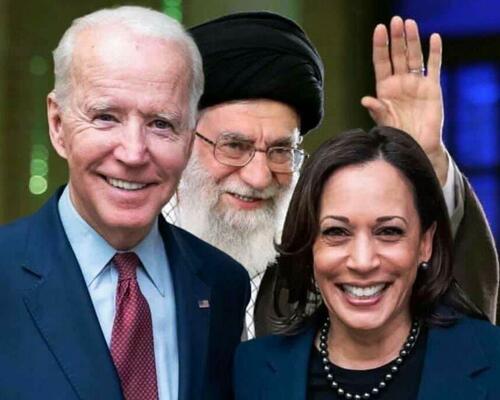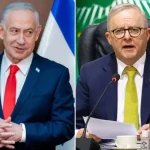
On Monday the UN's nuclear monitoring agency IAEA announced that Iran's enriched uranium stockpile now stands at over 30 times the threshold set by the 2015 deal limit which the US unilaterally pulled out of under the Trump administration in 2018.
The IAEA also confirmed that there have been no talks or contact with Tehran over its nuclear program in the wake of the death of President Ebrahim Raisi on May 19, when his helicopter crashed into the side of a mountain near the Azerbaijan border.
Despite at this point Iran's having expanded its near-weapons-grade fissile material to a record level, the Biden administration has reportedly been urging Western allies to back off plans to impose retribution or punishing actions on the Islamic Republic.
The Wall Street Journal is reporting the policy redirect this week, noting that it has put Washington on a collision course with leading European powers France and Britain over Iran nuclear policy. But after all, Biden has a November election to worry about, and apparently is keeping greater focus on prices at the pump.
"The U.S. is arguing against an effort by Britain and France to censure Iran at the International Atomic Energy Agency’s member-state board in early June, the diplomats said," WSJ reports. "The U.S. has pressed a number of other countries to abstain in a censure vote, saying that is what Washington will do, they said."
Officially, Biden admin representatives have denied that such a lobbying effort is taking place. But European leaders are concerned that the US is in effect defanging the UN atomic watchdog. Writes WSJ:
European diplomats have warned that failure to take action would undermine the authority of the IAEA, which polices nonproliferation of nuclear weapons. They say it also weakens the credibility of Western pressure on Iran. And they are frustrated over what they see as U.S. efforts to undermine their approach.
The last time the IAEA passed a formal resolution rebuking Iran over its nuclear program was back in November 2022.
At the moment, France and Britain believe the Biden White House is asleep at the wheel and ultimately has no strategy for dealing with Iran's fast advancing nuclear program.
The US has been consumed instead with seeking de-escalation in the Middle East after Israel's April 1st brazen attack on Iran's embassy in Damascus, which killed a top IRGC general and several others. There have been reports the US intervened diplomatically with Tehran behind the scenes, urging it to soften its retaliatory response - and possibly offering incentives for it to do so.
Iran is now deemed a nuclear-threshold state and could any day or week now suddenly declare itself a nuclear weapons state - assuming it is actually poised to achieve a bomb and intent on it.
However, on an official government level at least... the Islamic Republic says it is only seeking to develop peaceful nuclear energy capabilities. The Ayatollahs over many years have issued multiple religious edits or fatwas declaring nuclear weapons to be 'unIslamic'.
But some analysts believe Tehran has some clear and legitimate incentives to secretly develop a nuke: 1) Israel has a huge stockpile of undeclared nukes already 2) the US has led regime change wars along either of Iran's borders: Afghanistan and Iraq 3) a mere years after Libya's Muammar Gaddafi gave up his nuclear aspirations and WMD program, he was overthrown and murdered in a NATO-backed military intervention.
On Monday the UN’s nuclear monitoring agency IAEA announced that Iran’s enriched uranium stockpile now stands at over 30 times the threshold set by the 2015 deal limit which the US unilaterally pulled out of under the Trump administration in 2018.
The IAEA also confirmed that there have been no talks or contact with Tehran over its nuclear program in the wake of the death of President Ebrahim Raisi on May 19, when his helicopter crashed into the side of a mountain near the Azerbaijan border.
Despite at this point Iran’s having expanded its near-weapons-grade fissile material to a record level, the Biden administration has reportedly been urging Western allies to back off plans to impose retribution or punishing actions on the Islamic Republic.
The Wall Street Journal is reporting the policy redirect this week, noting that it has put Washington on a collision course with leading European powers France and Britain over Iran nuclear policy. But after all, Biden has a November election to worry about, and apparently is keeping greater focus on prices at the pump.
“The U.S. is arguing against an effort by Britain and France to censure Iran at the International Atomic Energy Agency’s member-state board in early June, the diplomats said,” WSJ reports. “The U.S. has pressed a number of other countries to abstain in a censure vote, saying that is what Washington will do, they said.”
Officially, Biden admin representatives have denied that such a lobbying effort is taking place. But European leaders are concerned that the US is in effect defanging the UN atomic watchdog. Writes WSJ:
European diplomats have warned that failure to take action would undermine the authority of the IAEA, which polices nonproliferation of nuclear weapons. They say it also weakens the credibility of Western pressure on Iran. And they are frustrated over what they see as U.S. efforts to undermine their approach.
The last time the IAEA passed a formal resolution rebuking Iran over its nuclear program was back in November 2022.
At the moment, France and Britain believe the Biden White House is asleep at the wheel and ultimately has no strategy for dealing with Iran’s fast advancing nuclear program.
The US has been consumed instead with seeking de-escalation in the Middle East after Israel’s April 1st brazen attack on Iran’s embassy in Damascus, which killed a top IRGC general and several others. There have been reports the US intervened diplomatically with Tehran behind the scenes, urging it to soften its retaliatory response – and possibly offering incentives for it to do so.
Iran is now deemed a nuclear-threshold state and could any day or week now suddenly declare itself a nuclear weapons state – assuming it is actually poised to achieve a bomb and intent on it.
However, on an official government level at least… the Islamic Republic says it is only seeking to develop peaceful nuclear energy capabilities. The Ayatollahs over many years have issued multiple religious edits or fatwas declaring nuclear weapons to be ‘unIslamic’.
But some analysts believe Tehran has some clear and legitimate incentives to secretly develop a nuke: 1) Israel has a huge stockpile of undeclared nukes already 2) the US has led regime change wars along either of Iran’s borders: Afghanistan and Iraq 3) a mere years after Libya’s Muammar Gaddafi gave up his nuclear aspirations and WMD program, he was overthrown and murdered in a NATO-backed military intervention.
Loading…





